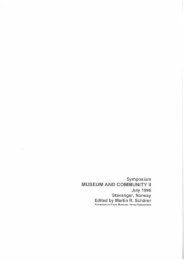Key Concepts of Museology - ICOM
Key Concepts of Museology - ICOM
Key Concepts of Museology - ICOM
Create successful ePaper yourself
Turn your PDF publications into a flip-book with our unique Google optimized e-Paper software.
70<br />
guide-lecturer or lecturer, who<br />
accompanies visitors (most <strong>of</strong>ten in<br />
groups) through the exhibition galleries,<br />
giving them information about<br />
the exhibition and the objects on display,<br />
essentially following the principle<br />
<strong>of</strong> guided visits. This fi rst type <strong>of</strong><br />
accompaniment has been joined by<br />
the function <strong>of</strong> animator, the person<br />
in charge <strong>of</strong> workshops or other experiences<br />
coming under the museum’s<br />
communication methods, and then<br />
that <strong>of</strong> cultural projects coordinator<br />
who is the intermediary between the<br />
collections and the public and whose<br />
aim is more to interpret the collections<br />
and to encourage the public to<br />
take interest in them than to systematically<br />
teach the public according to a<br />
pre-established content. Increasingly<br />
the web master plays a fundamental<br />
role in the museum’s communication<br />
and mediation tasks.<br />
5. Other cross-cutting or ancillary<br />
occupations have been added to these<br />
pr<strong>of</strong>essions. Among these are the<br />
head or project manager (who may be<br />
a scientist, or a museographer) who<br />
is responsible for all the methods for<br />
implementing the museal activities<br />
and who groups around him specialists<br />
in the fi elds <strong>of</strong> preservation,<br />
research, and communication in<br />
order to carry out specifi c projects,<br />
such as a temporary exhibition, a<br />
new gallery, an open reserve, etc.<br />
6. In more general terms it is very<br />
likely that administrators or museum<br />
managers, who already have their own<br />
committee in <strong>ICOM</strong>, will emphasise<br />
the specifi c skills <strong>of</strong> their function by<br />
distinguishing it from other organisations,<br />
for pr<strong>of</strong>i t or not. The same<br />
is true for many other administrative<br />
tasks such as logistics, security,<br />
information technology, marketing,<br />
and media relations, which are all<br />
growing in importance. Museum<br />
directors (who also have associations,<br />
particularly in the United States)<br />
have pr<strong>of</strong>i les that cover one or more<br />
<strong>of</strong> the above pr<strong>of</strong>i ciencies. They are<br />
symbols <strong>of</strong> authority in the museum,<br />
and their pr<strong>of</strong>i le (manager or curator,<br />
for example) is <strong>of</strong>ten presented<br />
as indicative <strong>of</strong> the development and<br />
action strategy that the museum will<br />
adopt.<br />
CORRELATED: ANIMATOR, COMMUNICATOR,<br />
CONSERVATION, CURATOR, CULTURAL PROJECTS<br />
COORDINATOR, EDUCATOR, EVALUATOR, EXHIBIT<br />
PRACTICE, EXHIBIT STUDIES, EXHIBITION DESIGNER,<br />
GUARD, GUIDE, GUIDE-INTERPRETER, INTERIOR DESIGNER,<br />
LECTURER, MANAGEMENT, MEDIATOR, MUSEOGRAPHY,<br />
MUSEOLOGIST, MUSEOLOGY, MUSEUM PRACTICE,<br />
MUSEUM STUDIES, PROJECT MANAGER, RESEARCHER,<br />
RESTORER, SECURITY OFFICER, STAGE DESIGNER,<br />
TECHNICIAN, VOLUNTEER.<br />
PUBLIC<br />
n., adj. (Latin publicus, populus: people or<br />
population) – Equivalent in French: public,<br />
audience; Spanish: público; German:<br />
Publikum Besucher; Italian: pubblico; Portuguese:<br />
público.<br />
The term has two accepted meanings,<br />
according to whether it is used<br />
as an adjective or a noun.<br />
1. The adjective ‘public’ – as in<br />
‘public museum’ – explains the legal<br />
relationship between the museum
















